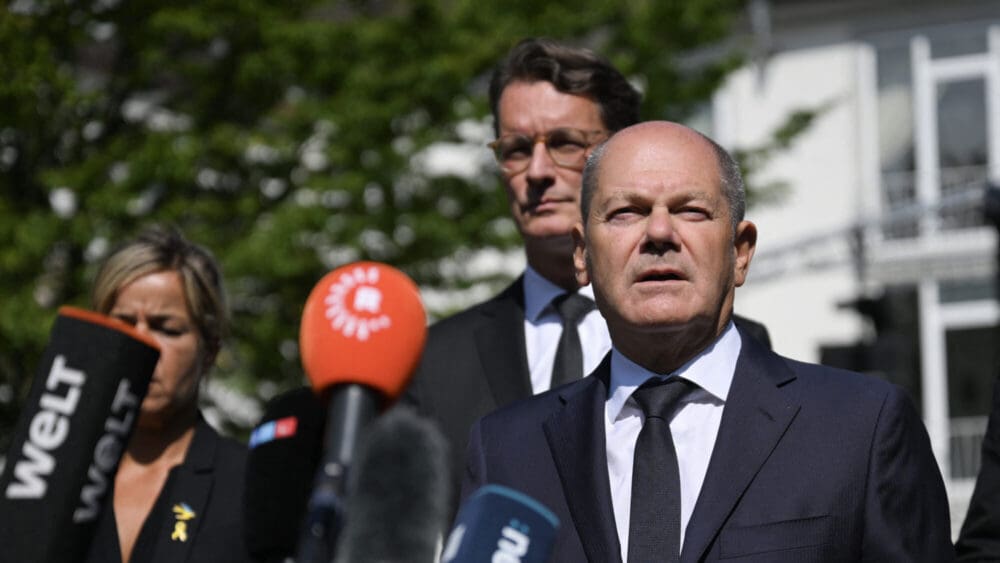
German Chancellor Olaf Scholz talking at the site of the Solingen terror attack
Ina Fassbender / AFP
Migration is now back at the center of German political discourse following the recent terror attack perpetrated by a deportation-evading failed asylum seeker from Syria that left three dead in the city of Solingen last Friday. For once, the left-wing government of Chancellor Olaf Scholz is appearing to listen to voters and the populist opposition parties demanding a radical change in the country’s asylum policies.
On Monday, August 26th, Scholz not only promised to tighten domestic regulations but also called for an international “task force” of selected European Union member states to reevaluate the entire bloc’s asylum and migration strategy—even though Brussels’ flagship ‘Migration Pact’ was passed just months ago, after being in the works for nearly a decade.
The Solingen knife attack has heightened concerns that Germany’s deportation laws are not working, neglected or hampered by traffic light coalition politicians in the German and European (EP) parliaments for many years.
As we reported previously, the attack took place at the city’s ‘Festival of Diversity’ (ironically), where the 26-year-old knifeman—identified only as “Syrian national Issa Al H.”—stabbed eleven attendees in the neck, killing three and leaving four others in critical condition. The Islamic State (IS) was quick to claim responsibility and said “the attack on a gathering of Christians” was an act of “revenge for Muslims in Palestine and elsewhere.” Any clear connections between the attacker and the terrorist organization have yet to be confirmed.
Regardless of whether he acted alone or on orders of the IS, the attacker was ideologically motivated and must be answered as such, the chancellor stressed during a visit to Solingen on Monday. “That was terrorism, terrorism against us all,” Scholz said dramatically. “I want to make it clear that I am angry and furious at this act, which must be punished quickly and severely.”
The chancellor then addressed Germany’s failure to deport Al H.—when his asylum claim was rejected in early 2023, and still being granted temporary protection six months later—by putting forward a whole range of promises meant to overhaul the country’s asylum system. Among others, Scholz promised to keep the current “temporary” border checks (installed for football’s European Championship earlier this summer) in place for an indefinite period and vowed to do “everything we can to ensure that those who cannot and should not stay here in Germany are repatriated and deported.”
Of course, opposition voices often highlight how Scholz has been promising to tighten asylum laws for years, only for the country to be shaken by yet another attack every few months. Most of these could have been easily prevented—if Berlin took deportations seriously. As of December last year, there were nearly 250 thousand people in Germany salted for deportation, while only around 16,000 had been actually deported during the entire year.
Moreover, appearing tough on migration is especially important now, as only days remain until the regional parliamentary elections in the three East German states begin. These are historically the greatest strongholds of the anti-migration right-wing populist Alternative für Deutschland (AfD) that won June’s EU elections in nearly every East German district.
Scholz, therefore, decided to change strategy and redirect some blame towards Brussels, implying that EU regulations hinder Germany’s effective response to migration—despite his socialists having always been one of the main opponents of stricter asylum rules both in the EU’s Council and ithe EP. Nonetheless, Scholz now called for an international “task force” of selected EU member states to reevaluate the application of EU asylum and deportation rules, adding, somewhat vaguely, that “some things will have to be changed in European law.”
If meant genuinely, the chancellor’s comments mark a major shift in Germany’s approach to EU migration policy. A growing majority of EU member states have been calling for stricter asylum rules and swifter deportation protocols in recent months, but Germany wasn’t one of them. Until now.
For instance, the Scandinavian and Baltic countries in June sent a letter to the European Commission demanding that “instrumentalized” migration—such as Russia and Belarus shipping asylum seekers directly to the EU borders—be regarded as a security issue rather than a migration one, allowing member states to take a more effective stand and be given additional tools to strengthen their external borders.
Another initiative launched by Denmark and the Czech Republic, which already achieved majority consensus back in May, calls for completely outsourcing asylum procedures beyond the EU borders that would prevent rejected claimants from disappearing in the bloc and make deportations significantly easier. In short, most EU countries now want Brussels to implement Italy’s Albania deal for the whole of the EU, despite their MEPs fighting tooth and nail against any prospects of “externalizing” migration for years.
Indeed, the irony in calling for tougher rules is that Brussels barely managed to adopt the final version of the bloc’s flagship policy package, the Asylum and Migration Pact just months ago, hastened by June’s EU election. For years, Conservative parties and governments have been criticizing the Pact for not failing to protect the external borders and not being tough enough on deportations, yet the EU mainstream—including Scholz’s socialists—stood against them at every turn. Now they want measures that they prevented from inclusion in the Pact!
Nonetheless, at this point Scholz’s remarks feel like nothing more than his grasping for the correct optics. Migration will definitely continue to dominate the EU agenda, but it is highly unlikely that Germany would force the European Commission to reopen the Migration Pact, which its president von der Leyen regards as one of her biggest success stories. There might be a bigger push for complementary legislation in the coming years, but at some point, we might need to ask whether there’s any point in doing that if the core legislation has already failed even before implementation begins.
